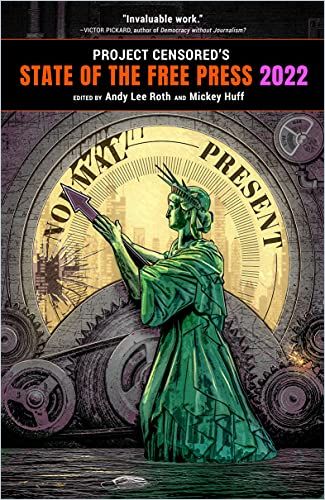Project Censored details stories that corporate interests and mainstream media suppress or ignore.

What You Don’t Know
In this annually updated report, Project Censored’s director, Mickey Huff (also president of the nonprofit Media Freedom Foundation) and its associate director, Andy Lee Roth, showcase news censorship.
Journalism Under Siege
Corporations and hedge funds threaten democracy by cutting newsroom budgets to the bone and leaving much of America with no access to crucial events, policies, and information. When corporate media does tackle important subjects, it distorts, exaggerates, falsely balances its reporting, and publishes false reports, or just gets things wrong.
For example, Google’s YouTube hurts the funding of alternative news sources by removing their channels or videos. YouTube rarely provides a warning or identifies any reason for its actions.
Journalism’s future depends on citizen engagement. One approach to ensuring a healthy media would be to fund it “as a public utility.”
Corporate media seek high ratings with no regard for public interest. Media industry consolidations have left many locations with only one media voice – and some with none. In a trend accelerated by COVID, traditional media staffing declined by almost one quarter in the decade after 2008.
The new media giants…function as the arbiters of public issues and legitimate discourse, despite assertions by their leaders that they are tech platforms, not publishers.Andy Lee Roth, Mickey Huff
Active independent and nonprofit news sources lack financial strength. Facebook and Google do not fairly compensate publishers for the news they provide.
Events of 2021 – including the COVID outbreak – parallel the era of World War I, when civil rights were under assault, a pandemic threatened society, and economic instability loomed. Investigative journalists who target the financial shenanigans of powerful people have been subjected to threats, lawsuits, and attacks.
Since 1976, Project Censored has spotlighted ignored or underreported issues. It works with students and faculty at US colleges to identify potential stories, prioritizes them for “prominence, social impact, and timeliness,” and includes the top 25 in its annual report.
Project Censored identified the most important underreported issue for the year of this report as the crisis looming for US citizens who depend on Medicare for prescription medication coverage. The report predicts that more than one million retirees will die when they reach the time when they can no longer afford necessary medications. This death toll will spring from the clout of pharmaceutical companies and the failure of politicians to restrain their greed.
Other stories identified as underreported include the Marshall Project report that police departments use dogs as weapons disproportionately against people of color.Another underreported problem is femicide – partners or ex-partners kill a woman in the United States, on average, every four days. Most perpetrators have records of abusive behavior, and a third of their victims had reached out to the police. With rare exceptions, corporate media approach the femicide issue only as it exists outside the United States and the United Kingdom. The media also didn’t cover Pfizer’s tactics in Latin America, where it made it harder for poor countries to access COVID vaccines.
Neglected news that affects your welfare
In another underreported story, Project Censored cites the efforts of industrial agriculture to lobby for legislation that prevents farmers from using heritage seeds. This so-called “plant variety protection” prevents farmers from using their own seeds, forces them to buy seeds from corporate supplies, and imposes strict controls on non-GMO plants.
Some countries have laws that prevent anyone from certifying traditional heirloom seeds as such. This is bad policy because growing a food crop from a uniform gene pool makes it more vulnerable to stress than growing crops from a diverse gene pool – all at a time when climate change is increasing environmental stresses. Corporate media generally overlook the seed sovereignty movement. The New York Times published one article in June 2019.
The blockade of establishment news coverage need not be total…for an issue to remain unknown to all but a small segment of the public that actively seeks reporting on that topic.Andy Lee Roth, Mickey Huff
Factory farming methods and the industrialization of animal husbandry have led to new bird flu viruses in Asia. Factory farms give their animals large doses of antibiotics, thus contributing to the proliferation of drug-resistant microbes. The World Health Organization listed antimicrobial resistance as one of the top 10 global health threats in 2020.
Mainstream media also failed to sound the alarm about microplastics and toxic chemical PFAs, which are increasingly contaminating seafood. Hakai Magazine cited the threat of “coastal darkening,” which occurs when pollution obscures ocean waters nearest to land, compromising the life cycles of plants and affecting ocean fauna. Only The Atlantic and EcoWatch picked up on Hakai’s story.
Big Tech has also been found to censor academia. For example, Zoom canceled the streaming of academic discussions when outside groups objected to the forums.
The Propwatch Project, “the world’s first searchable video repository of propaganda techniques,” offers discussions of propagandists’ methods. Users learn to resist propaganda via “inoculation,” by examining examples of propaganda and analyzing them to build resistance.
Reporting gaps
Independent media and a few investigative journalists can fill only some of the crucial reporting gaps that Roth and Huff identify in this rundown of the most important censored stories of 2020-2021. They make a solid, evidence-based case that some mainstream and social media outlets deliberately keep readers in the dark about laws, policies, actions, and information that profoundly affect their lives in ongoing negative ways. Even media-savvy readers, regardless of their politics, may be shocked at the extent of willful censorship that restricted their knowledge of the United States and the world as of the publication of this rundown. Those who want to stay current with the truth will find the report both illuminating and unsettling and will hasten to read Project Censored’s subsequent annual reports.




